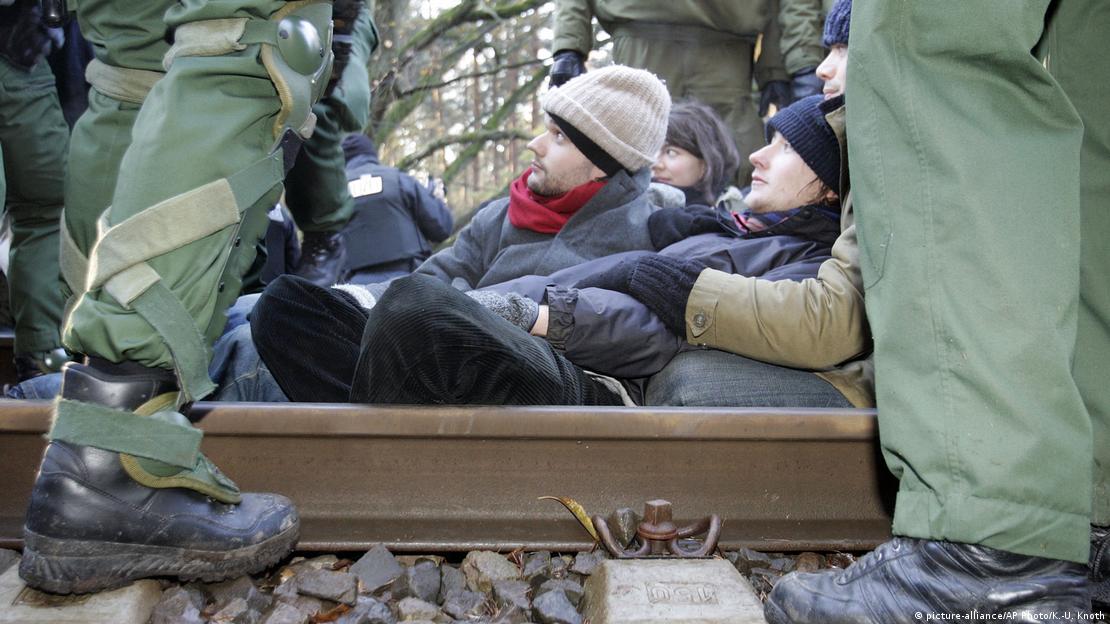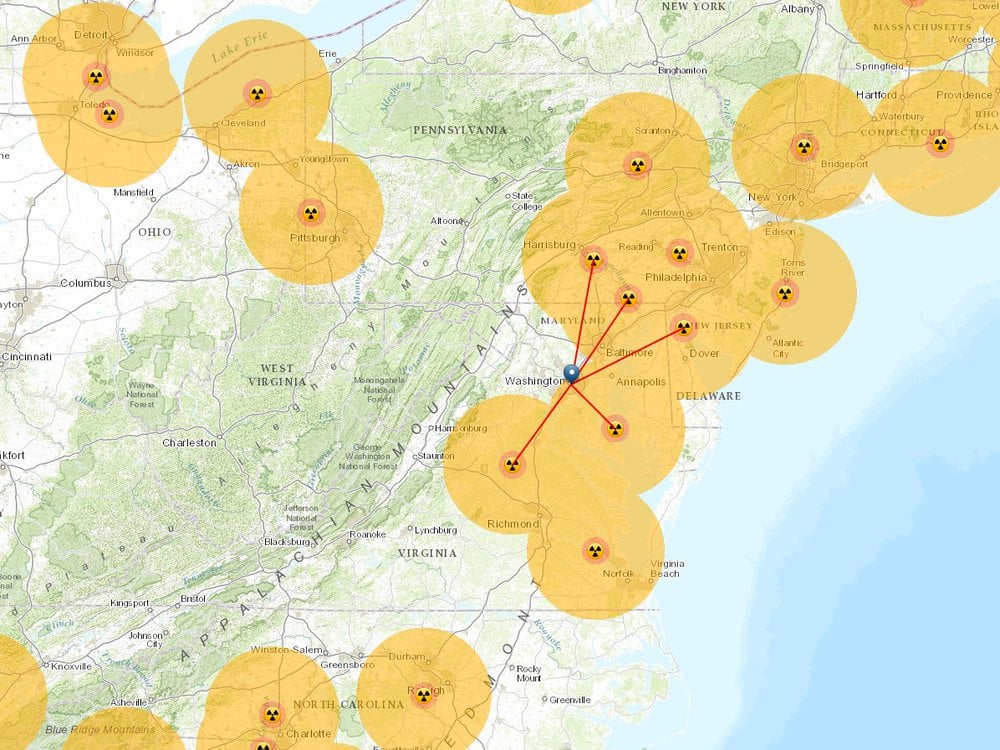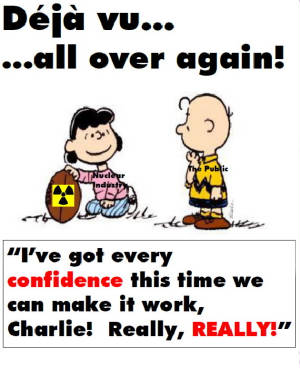|
CURRENT NUCLEAR WASTE IS ALREADY WITHOUT PERMANENT HOME(S), AND CASKS ARE LEAKING......:
"Highly radioactive waste, often called high-level waste, comes mainly in two forms. One is leftover fuels that were used
in nuclear power plants to generate electricity. The other is the waste made by facilities involved in nuclear weapons production
or by facilities that reprocess and recycle used power plant fuel. ....
During World War II and throughout the Cold War era, the US generated millions of liters of radioactive waste—a mix
of liquid, sediment, and sludge—in the name of national defense. The toxic waste, a by-product of creating plutonium
for nuclear bombs, was collected for 45 years in underground storage tanks mainly in Hanford, Washington, and the Savannah
River Site in South Carolina. In Hanford alone, more than 200 million L of this waste still sits after many decades in
underground tanks waiting to be processed, according to Thomas M. Brouns, who leads the environmental management sector
at nearby Pacific Northwest National Laboratory (PNNL). About one-third of the nearly 180 storage tanks, many of which
long ago outlived their design lives, are known to be leaking, contaminating the subsurface and threatening the nearby Columbia
River. Another 136 million L of the stuff awaits processing at the Savannah River Site.
Addresses nuclear weapons, waste, and the inability to "recycle" radioactive nuclear waste....
"Nuclear Reaction: Why Do Americans Fear Nuclear Power" Readings - "Frontline" | PBS
"The nation {USA} has over 85,000 metric tons of spent nuclear fuel from commercial nuclear power plants. Department
of Energy is responsible for disposing of this high-level waste in a permanent geologic repository but has yet to build such
a facility because policymakers have been at an impasse over what to do with this spent fuel since 2010. As a result,
the amount of spent nuclear fuel stored at nuclear power plants across the country continues to grow by about 2,000 metric
tons a year. Meanwhile, the federal government has paid billions of dollars in damages to utilities for failing to dispose
of this waste and may potentially have to pay tens of billions of dollars more in coming decades. If Congress were to authorize
a new consent-based process for siting a repository, it could help break the impasse over a permanent solution for commercial
spent nuclear fuel."
Georgia Power starts with, "Keep this brochure to use in the unlikely event of an emergency" yet on page 18 it addresses LARGE
SCALLE "RADIATION EMERGCNCIES"...
Georgia Power sure makes a lot of claims: "We protect the environment. "We care about your safety." "We are the most reliable."
"Efficiency is the core."
But the TRUTH IS, on the very last page is a printable,
"FAMILY EMERGENCY PLAN: Be prepared to rapidly respond to a plant event by completing this simple evacuation checklist."
"Capping in place refers to storage of coal ash, a hazardous byproduct of the coal production process, in a covered but unlined
pit. State regulators have not yet issued permits approving the power company’s plans.
Georgia Power has not released estimates of how much it would cost to dispose of the waste by an alternate method, saying
this information is a trade secret. In 2021, an investigation by Georgia Health News and ProPublica found that the cap-in-place
plan would cost ratepayers $7.3 billion — and estimated that an alternate cleanup method would likely cost more than
$10 billion."
"70 years after humankind began using nuclear energy, not a single permanent waste storage site has been officially opened
anywhere in the world."
"Teenage Mutant Kung Fu Chickens" - Ray Stevens
"Teenage Mutant Kung Fu Chickens" - Ray Stevens Animation
| GERMANY AND NUCLEAR WASTE |

|
| PROTESTORS REGULARLY CHAIN THEMSELVES TO TRAIN TRACKS TO STOP NUCLEAR WASTE ARRIVING IN GORLEBEN |

NUCLEAR ENERGY
"As long as you hate, there will be people to hate." - George Harrison
"Love is something you do not trespass." - S.S.
Nuclear energy, bombs, weapons, injuries, spills, waste, barrels, where to store,... easy targets to be bombed today....
"Mother and Child" - 1964 Campaign Commercial
"Germany's Radioactive Boars are a Bristly Reminder of Nuclear Fallout" - American Association for the Advancement of Science
(2023)
This page explores the consistent challenges of nuclear plants, its material needs, its' radioactive toxic waste, collection,
where disposed, and whether future of nuclear energy has any future. On the left column below, read specifics regarding toxic
nuclear waste. NO, it is not a "Clean Energy." [Pure salespeople from the Nuclear Plant industry - like Exelon.] On the
right column below, read diligently Baltimore and Exelon relationship and history, unveiling all corrupt Exelon methods in
action continue for decades to present day.
| NUCLEAR POWER PLANT LOCATIONS |

|
| NUCLEAR POWER PLANT LOCATIONS SMITHSONIAN MAGAZINE |
America's 62 Active Nuclear Power Reactors / Plants - ArcGIS [Tracking, Map, & More]
NUCLEAR REACTORS (POWER PLANTS) AND NUCLEAR WEAPONS
"Nuclear 101: How Does a Nuclear Reactor Work?" - Office of Nuclear Energy (2021)
"The most common fuel for nuclear power plants is uranium. Processing uranium requires mining, milling, enrichment, and fuel
fabrication, all of which use significant quantities of water.
Uranium mining consumes one to six gallons of water per million Btus of thermal energy output, depending on the mining
method. Mining uranium also produces waste that can contaminate local water sources, and which can be especially
dangerous given the radioactivity."
Nuclear Weapons to Nuclear Reactors
"The main difference in comparing nuclear weapons to nuclear reactors/power plants is the time an amount of energy they produced
is used.
Inside a nuclear reactor, the energy is generated over a period of time (weeks, months, and years), and fission fragments
are building up the entire operation of a power plant, continuously creating radioactive. Inside a nuclear weapon, all it
energy is used in an instant, and hence, radiation - radioactive waste is made (fission fragments) and .
So a nuclear reactor can produce radioactive fission fragments continuously over a long period of time while a nuclear weapon
produces them in one shot. And in the "for what it's worth" category, a 20 kiloton (kT) nuclear weapon produces as much energy
as a 1,000 megawatt (MW) nuclear reactor that's operating for one day. A 1,000 MW reactor that's operating for a longer period
of time will be producing more fission products."
"Merchant" means privately owned. Exelon is merchant majority.
FEBRUARY 22ND, 2023: No Injuries, Release of Radioactivity After Uranium Fire at Y-12 in Oak Ridge, Tennessee [Department
of Energy Nuclear Facility] - WATE TV 6 ABC
"Past owners of the Indian Point Energy Center, which opened in 1962, had been releasing radioactive waste water
into the Hudson for decades. Through federal, state and local investments and actions, the Hudson River is much cleaner
today than it once was, and the river now provides increased and significant economic strength to the communities that
line its shore and the state as a whole.
“After decades of tremendous efforts to clean up the Hudson River, the idea of anyone dumping radioactive water into
this estuary, the economic lifeblood of our region, is simply outrageous,' said Harckham. 'No person,
corporation, or government has the right to recklessly pollute New York State’s waters, and the mere idea
that this is being contemplated is troubling. While the decommissioning of a nuclear power plant is a complex issue,
there can be no rationale for releasing radioactive waste into the Hudson.'"
"Harckham and Levenberg Introduce Bill to Ban Release of Radioactive Waste Into the Hudson River - Yonkers Times (February
25th, 2023)
HOW MUCH DOES ONE NUCLEAR REACTOR POWER PLANT COST?
One nuclear power plant costs at least 30 Billion (projected way over) for one nuclear reactor plant, not including
landfill and disposal for toxic radioactive waste.
THE GEORGIA PLAN: PLANT VOGTLE TO COST $14 BILLION - BE BUILT BY WESTINGHOUSE AND COMPLETE IN 2017.
GEORGIA'S RADIOACTIVE-TOXIC WASTE PLAN: PLACE UNLINED WITH COAL ASH FROM COAL PLANTS;
DIRECTLY IN PATHWAY OF DRINKING WATER.
THE RESULT IS: Westinghouse bailed, seven years behind, with final cost of at least $37 Billion. The two Vogtle units can
only service enough electricity to power about 1 million homes.
Unlimited cost of radioactive toxic waste from nuclear plants and coal ash from coal plants to be unlined where groundwater
exists. Catastrophic if EPA ban set by Democrats is lifted....
"A nuclear power plant being built in Georgia is now projected to cost its owners more than $30 Billion."
MAKE THAT OVER 35 BILLION: "A Second New Nuclear Reactor Is Completed in Georgia. the Carbon-Free Power Comes at a High Price"
- U.S. News and World Report (April 29, 2024)
MAKE THAT 37 BILLION - PAID BY POVERTY STRIKEN "Georgia Power customers may see an increase of as much as 10%
on their energy bills this year. Patty Durand claims that this increase will help cover the $37 billion cost
of the plant, including $20 billion in cost overruns. ....
Not even PSC. Only monopoly corporate energy company, the most expensive utility way of received energy: 'We don’t
have any representation to protect us from whatever Georgia Power wants.' The rate increase Durand says Plant Vogtle
is driving could have deadly consequences. Energy poverty, or when households are unable to access essential energy services,
could be exacerbated in the state.
'We're not talking about sitting around in the dark when someone loses their power. We're talking about very serious consequences.
For instance, someone could lose their children. DFACs will not allow parents to have children in a home with no power. They
could be evicted. Even worse, someone could die in Georgia's brutal summer heat.' ....
'{US Energy Secretary Jennifer Granholm} Granholm is up there calling for tripling reactors with no knowledge of what they
cost. How can she sleep at night when she’s calling for such an expensive source of energy that will harm ratepayers
across the board when there’s so many more affordable options available?'"
LET'S PLAY - THE "NUCLEAR" GAME!: Nuclear waste must be locally stored due to Congress procrastinating for decades on permanently
store-housing all in one place. Due to no place; "for it to go," the nuclear plant companies continually are able to profit
- be completely subsidized through suing the Federal Government, making money hand over fist. So the Nuclear Plant owners
make money on the waste, and make money raising prices for electricity for their customers, claiming higher costs for radioactive
waste removal (Who wants to do that deadly job?). That's - The Nuclear Power Game! You always lose!!!!!!
NOBODY - NO STATE - NO MOUNTAIN - NO WATER BODY - NOBODY WANTS PERMANENT RADIOACTIVE STORAGE LOCATION FOR ALL NUCLEAR WASTE.
DOESN'T THIS MEAN WE MUST STOP PRODUCING MORE?
"Meanwhile, the federal government has paid billions of dollars in damages to utilities for failing
to dispose of this waste and may potentially have to pay tens of billions of dollars more in coming decades. If Congress
were to authorize a new consent-based process for siting a repository, it could help break the impasse over a permanent solution
for commercial spent nuclear fuel."
"'This really traces back to deregulation in the industry,' said George Bilicic, vice chairman and global head of power energy
and infrastructure at the financial advisory and asset management firm Lazard. In the United States, 17 states with nuclear
power plants are regulated, and 10 states with nuclear power plants are deregulated, according to the Nuclear Energy Institute.
In deregulated markets, nuclear power generators have to sell their energy on an open market, where distribution
companies will choose the most inexpensive energy option that can do the same job. Today, that’s often natural
gas.
'One of the key factors that drives the economics of nuclear is just how cheap natural gas is. When natural gas
is cheap, it is extremely difficult for nuclear to make the revenue that it needs to remain operational and economic.'
said Ben King, a senior analyst with the energy and climate division at Rhodium Group, a market research firm.
Given current natural gas prices and projections, King and his colleagues have projected that as much as a third of current
nuclear energy fleet capacity in the U.S. may retire. The nuclear fleet will decline from about 96 gigawatts at about
60 nuclear facilities in the U.S down to as low as 60 gigawatts by 2030, the firm predicts."
"Why People Want to Put Small Nuclear Reactors Everywhere" - DW Planet A (Apr 12, 2024)
"Do We Need Nuclear Power to Stop Climate Change?" - DW Planet A (July 16, 2021) [TOXIC WASTE]
~
Nuclear History to Retrospective on Kubrick's, "Dr. Strangelove" - Soren Kierkegaard Journals
"Dr. Strangelove Or: How I Learned To Stop Worrying And Love The Bomb"
"Nuclear Weapons" - "Last Week Tonight with John Oliver" (2014)
"Nuclear Waste" - "Last Week Tonight With John Oliver" (2017)
"Nuclear Explained: Nuclear Power and the Environment" - United States Energy Information Administration (EIA)
"The time it will take for the radioactive material to decay will range from a few hours to hundreds of thousands of years.
Some radioactive elements, such as plutonium, are highly radioactive and remain so for thousands of years. ....
Keeping distance between you and radioactive waste will help keep you from being exposed. Never touch, inhale or ingest
radioactive waste. Radioactive materials and other contaminants from waste can be very dangerous inside the body."
"The Controversial Future of Nuclear Power in the United States: As the Climate Crisis Worsens, the Discussion Intensifies
Over What Role Nuclear Power Should Play in Fighting it. - National Geographic (2021)
BOOK ~ Cover Up: What You Are Not Supposed to Know About Nuclear Power - By Karl Grossman
"Nuclear Power Today: Enviro Close-Up with Karl Grossman" (2018)
NUCLEAR ENERGY "Don't Look Up" Part 1 - Enviro Close-Up
NUCLEAR ENERGY "Don't Look Up" Part 2 - Enviro Close-Up
Karl Grossman is an investigative reporter, journalist, and author for more than 50 years. He currently is a professor of
Environmental Journalism and Investigative Reporting at the State University of New York/College at Old Westbury, as well
as host and interview for his 31+ Television show, "Enviro Close Up," and documentarian.


AIRPLANES, JETS, AND ALL AIR TRAVEL [RADIATION]
...................................................................................................................................................................................................................................................................................................................................................................................................................................................................................................................................
|
